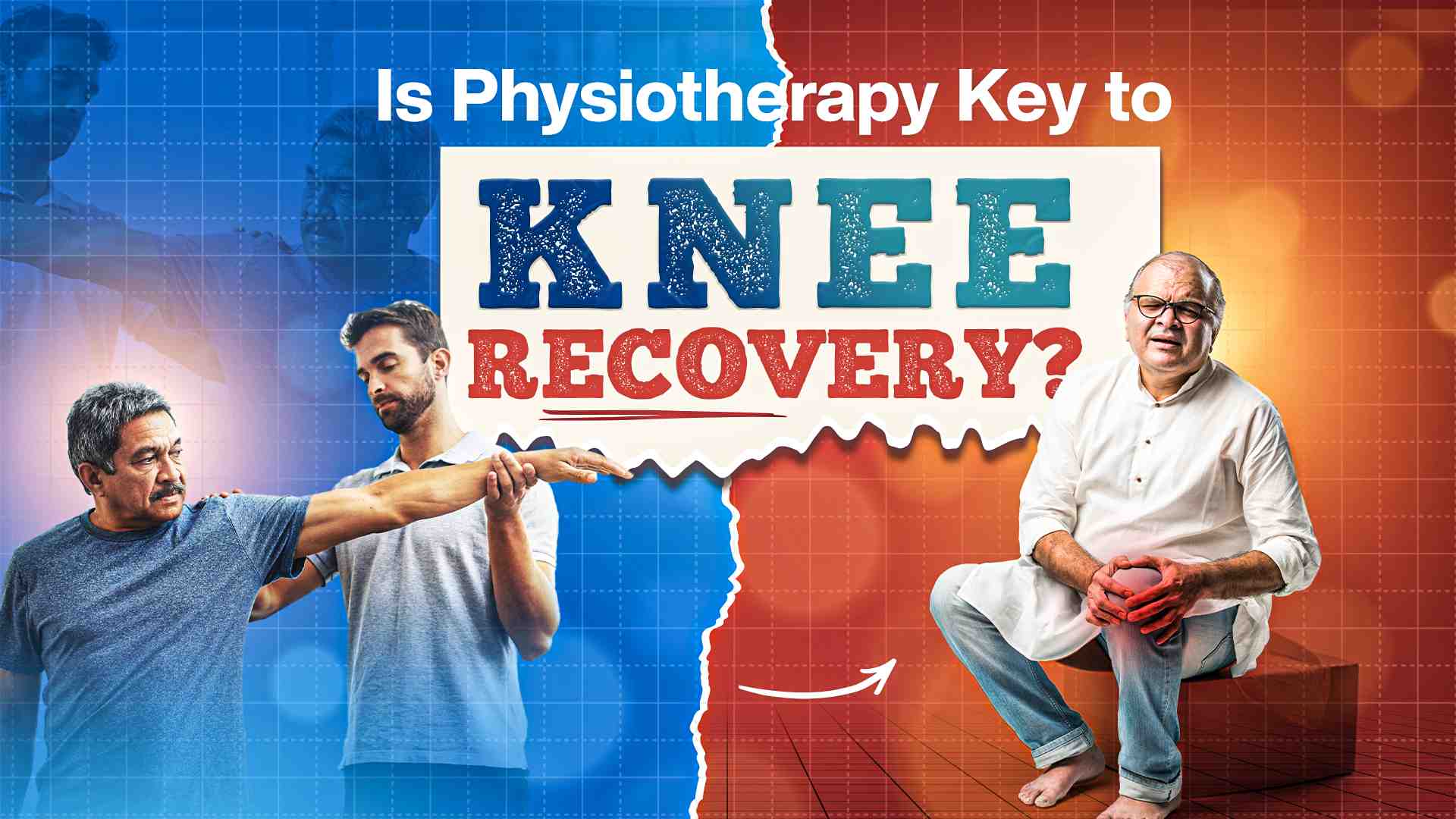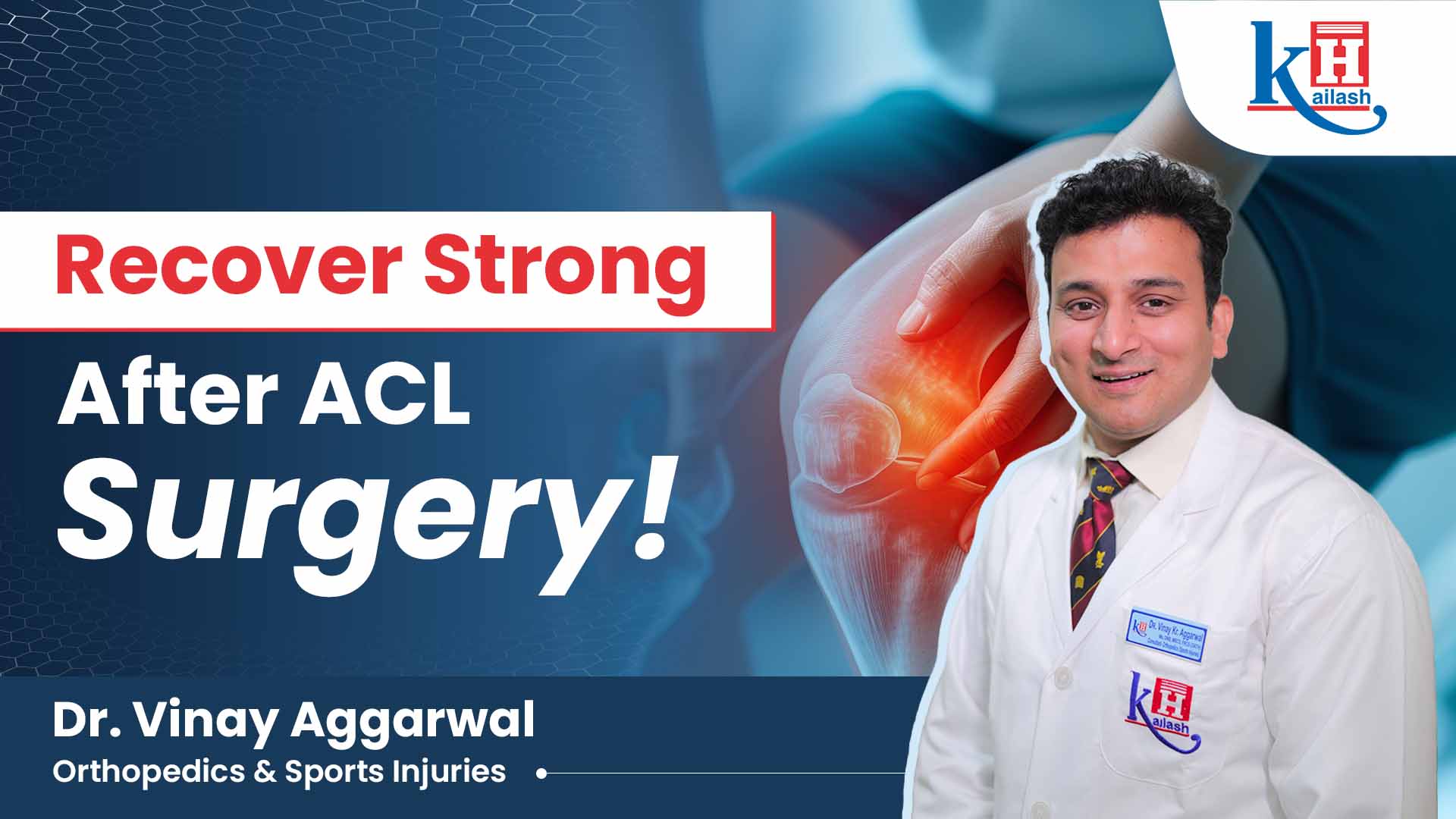Restoring Mobility: The Role of Physiotherapy after Knee Surgery
Verified By Dr. Varun Dawar | 02-Jan-2025
Knee surgeries, especially total knee replacements, are transformative procedures aimed at relieving pain and restoring mobility for individuals with severe knee joint issues. However, the success of such surgeries isn’t limited to the operating table; it extends to a comprehensive recovery plan that includes physiotherapy.
Dr. Varun Dawar, Head of the Department of Physiotherapy at Kailash Hospital, Noida, emphasizes the importance of post-operative physiotherapy, "Physiotherapy is critical after knee surgery to help patients regain strength, mobility, and independence. It’s an integral part of the recovery process that directly impacts the long-term outcome."
This article explores the vital role physiotherapy plays after knee surgery, the stages of rehabilitation, and the benefits it offers.
Table of Content
Physiotherapy after knee surgery, such as total knee replacement (TKR), focuses on regaining strength, flexibility, and range of motion in the affected joint. It also helps minimize post-surgical complications, such as stiffness, swelling, or blood clots.
Dr. Dawar explains, "A knee replacement surgery is only the beginning. Physiotherapy bridges the gap between surgery and a patient’s return to normal activities by ensuring the knee functions optimally."
Key benefits of physiotherapy include:
- Pain Management: Alleviates post-surgical pain with specific exercises tailored to the individual.
- Improved Range of Motion: Helps restore natural joint flexibility.
- Muscle Strengthening: Strengthens surrounding muscles to support the knee.
- Reduced Risk of Complications: Prevents conditions such as deep vein thrombosis (DVT) or stiffness.
Also read: Knee Replacement Surgery: Expert Answers to Common Questions
Physiotherapy for knee replacement is typically divided into stages, each with specific goals and exercises tailored to the patient’s progress.
1. Immediate Post-Surgery Phase (Days 1–7)
The initial phase begins in the hospital immediately after surgery.
- Goals: Control pain and swelling, and prevent blood clots.
- Therapies:
- Ankle pumps to promote blood circulation.
- Gentle bending and straightening of the knee.
- Use of assistive devices like walkers to encourage mobility.
Dr. Dawar advises, "It’s essential to start movement as early as possible to prevent complications like joint stiffness or muscle atrophy."
2. Early Rehabilitation Phase (Weeks 2–6)
This phase focuses on regaining joint mobility and muscle strength.
- Goals: Improve range of motion and enhance knee stability.
- Therapies:
- Strengthening exercises targeting the quadriceps and hamstrings.
- Gradual weight-bearing activities.
- Low-impact exercises, such as cycling or water therapy.
3. Advanced Rehabilitation Phase (Weeks 7–12)
By this stage, patients work towards resuming daily activities and building endurance.
- Goals: Enhance functional ability and prepare for independent mobility.
- Therapies:
- Resistance training to strengthen the leg muscles.
- Balance and proprioception exercises to prevent falls.
- Walking on a treadmill or outdoors to improve gait.
4. Maintenance Phase (Months 3 and Beyond)
The focus here is on maintaining the results achieved and returning to activities like sports or hobbies.
- Goals: Achieve long-term strength and joint health.
- Therapies:
- Advanced strength training.
- High-intensity exercises, if permitted by the surgeon.
- Stretching routines to prevent stiffness.
Recovering from knee surgery requires a comprehensive physiotherapy plan that employs multiple techniques to achieve optimal outcomes. Each modality plays a unique role in promoting healing, restoring function, and minimizing complications. Here’s a detailed look at the most effective techniques:
1. Manual Therapy
Manual therapy involves hands-on manipulation by a physiotherapist to address issues such as joint stiffness, scar tissue, and limited mobility.
- How it Works: Techniques like joint mobilizations, soft tissue massage, and stretching are applied to enhance joint movement and flexibility.
- Benefits:
- Breaks down adhesions in the soft tissue, improving range of motion.
- Stimulates blood flow to promote healing.
- Reduces pain and prevents scar tissue from restricting movement.
Dr. Varun Dawar notes, "Manual therapy is crucial for improving knee joint mechanics post-surgery. It complements exercise-based therapy by targeting specific problem areas."
2. Cryotherapy
Cryotherapy uses cold temperatures to reduce inflammation and pain after knee surgery.
- Techniques:
- Ice packs applied to the knee.
- Advanced cold compression systems that combine cooling and compression for deeper therapeutic effects.
- Benefits:
- Minimizes swelling and prevents fluid buildup around the joint.
- Numbs the area to provide temporary pain relief.
- Enhances post-exercise recovery by reducing soreness.
Patients are often advised to use cryotherapy several times a day during the initial stages of recovery.
Also read: Understanding Hip Dysplasia in Babies: Causes, Symptoms, and Treatment
Dr. Dawar stresses the importance of patient dedication, “The effectiveness of physiotherapy depends on the patient’s commitment to the prescribed exercises and routines. Regular follow-ups with a physiotherapist ensure that the recovery stays on track."
Patients who actively participate in their recovery are more likely to achieve faster and better results. Adhering to the physiotherapist's advice and maintaining a positive outlook play a significant role in the success of rehabilitation.
For individuals seeking knee replacement physiotherapy near me, Kailash Hospital, Noida, provides comprehensive post-surgical care. Under the expert guidance of Dr. Varun Dawar and his team, patients receive personalized rehabilitation plans designed to meet their unique needs and goals.
Physiotherapy after knee surgery is a cornerstone of recovery, ensuring patients regain mobility, strength, and independence. With expert guidance from Dr. Varun Dawar and the state-of-the-art facilities at Kailash Hospital, Noida, patients can embark on a successful journey to recovery.
If you or a loved one has undergone knee surgery, consult with a qualified physiotherapist to create a tailored recovery plan. Your commitment to rehabilitation can make all the difference in achieving a pain-free, active life!



 +91-9711918451
+91-9711918451
 international.marketing@kailashhealthcare.com
international.marketing@kailashhealthcare.com







